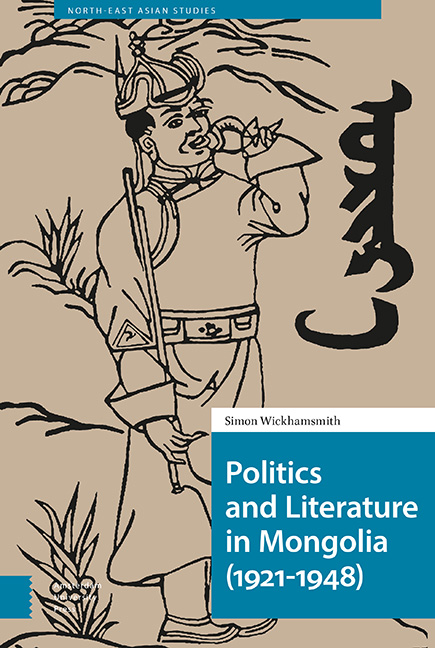Book contents
- Frontmatter
- Dedication
- Contents
- Transliteration and Mongolian Names
- Introduction
- 1 Prefiguring 1921
- 2 Staging a Revolution
- 3 Landscape Re-Envisioned
- 4 Leftward Together
- 5 Society in Flux
- 6 Negotiating Faith
- 7 Life and its Value
- 8 The Great Opportunistic Repression
- 9 A Closer Union
- Appendix: Brief Biographies of Writers
- Index
- Frontmatter
- Dedication
- Contents
- Transliteration and Mongolian Names
- Introduction
- 1 Prefiguring 1921
- 2 Staging a Revolution
- 3 Landscape Re-Envisioned
- 4 Leftward Together
- 5 Society in Flux
- 6 Negotiating Faith
- 7 Life and its Value
- 8 The Great Opportunistic Repression
- 9 A Closer Union
- Appendix: Brief Biographies of Writers
- Index
Summary
Abstract
Politics and Literature in Mongolia 1921-1948 is an account of the contribution made by Mongolian writers in building a new society following the 1921 Soviet-backed revolution. The literature of this time helped to frame the ideology of socialism and the practice of the revolution for those Mongolians who had little understanding of what it could offer them. Through a discussion of key topics in the socialist program – education, health care, religious belief, labor – it reveals in the work of writers such as D. Natsagdorj, S. Buyannemeh, Ts. Damdinsüren and D. Namdag the organic relationship that came to exist between literature and politics and how this relationship changed over the course of almost three decades, culminating in the First Congress of Mongolian Writers in 1948.
Keywords: revolutionary literature, Socialist Realism, cult of personality, Choibalsan, collectivization, industrialization, nomadic livestock herding
At the intersection of literature and politics, there is a feeling of potential, of what could be. Writers, whose craft with language can transport a reader's heart and mind to unimagined realms, work together with politicians, the most adept of whom enthuse their constituents through an admixture of idealism and pragmatism, and so it is that story and image transform – and are transformed by – society. It is such a transformation, earnestly desired and believed in, that lies at the heart of this book.
Mongolia was certainly transformed following its socialist revolution in 1921. Over time, people came to benefit from an education system that focused on basic literacy, a health care system based upon Western science, a political model in which local elected representatives came together to make decisions, and an infrastructure that made these developments more feasible. The revolution also brought political infighting, censorship, arbitrary power exchanges, draconian executions, the near-destruction of religion and the substantial weakening of certain aspects of cultural tradition.
Yet the period with which this book is concerned – from the revolution in the summer of 1921 until the First Writers’ Congress held during the first week of April in 1948 – was for Mongolia a period of sustained literary development, assisted in part through the financial and moral sponsorship of the Soviet Union, which allowed writers for the first time directly to apply themselves for the benefit of their fellow Mongolians.
- Type
- Chapter
- Information
- Politics and Literature in Mongolia (1921–1948) , pp. 11 - 24Publisher: Amsterdam University PressPrint publication year: 2020



